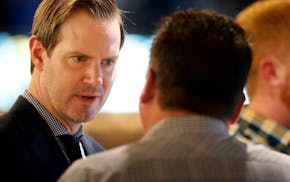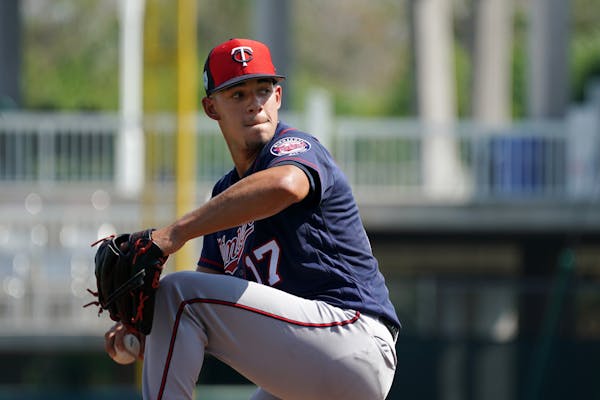FORT MYERS, FLA. – Stu Cliburn was first involved with the Venezuelan Professional Baseball League as a 23-year-old pitcher for Caracas Leones in the winter of 1980-81. The manager was supposed to be Jim Leyland, but he quit early in the season, was replaced temporarily by Mark DeJohn, and then Venezuela's first shortstopping legend, Chico Carrasquel, to close out the season.
This was a quick introduction for Cliburn into the spur-of-the-moment managerial and coaching decisions that will be made to mollify the fan bases of winter league teams in Venezuela, Puerto Rico and the Dominican Republic.
Even with that, Cliburn was caught by surprise with what occurred when he was called into the office of the boss of Venezuela's Maracaibo franchise, the Zulia Eagles, late in the 2006-07 season.
"My twin brother, Stan, was the manager and I was the pitching coach," Cliburn said. "We were about a .500 team in the middle of the season and Stan was fired. Got a check. Went home. Fine.
"Then, I get called up one afternoon. There was only a week left in the schedule, so I'm thinking, 'What can this be about?' Sure enough, the guy says, 'Stu, we have to fire you.' I'm saying, 'There's a week left; why bother?'
"The boss says, 'We fired Stan because our fans were unhappy with him as manager. We made the announcement of him being gone, and now the fans come to the game, see you and say, 'Why is he still in the dugout if you fired him? You lied.' "
Cliburn laughed at the thought of that firing for perhaps the 1,000th time in the past dozen years and said: "The Zulia fans thought I was Stan. They thought there was only one of us."
This is Cliburn's 28th season in the Twins organization, starting as the pitching coach for rookies in Elizabethton, Tenn. in 1992, with Ray Smith (still there) as the manager.
"You know who the hitting coach was?" Cliburn said. "Big Jim Lemon. What a great baseball guy."
Cliburn, 62, is entering his fourth season in this turn as the pitching coach at Class AAA Rochester. He also was with the Red Wings from 2006 to '08, then was the Twins' Class AA pitching coach for seven seasons.
He has survived the upheaval in the Twins' baseball operation. He is once again back in the big-league clubhouse for the early portion of spring training, with the other coaches on the Class AAA and Class AA staffs.
Cliburn also looked past the ongoing societal and political upheaval in Venezuela to return to that league as the pitching coach for the Magallanes Navigators in Valencia this winter. He has been a pitching coach for five Venezuelan teams and a total of 10 winters. He also coached four years in Puerto Rico, one autumn in the Arizona Fall League and in the Maryland fall league for its only season in 1998.
Quite a twist here: Cliburn has had the stability of a being a fixture in the Twins organization, while also answering the call of coaching for seven different teams and 14 years in Venezuela and Puerto Rico.
"I took four winters off from 2011 to 2014, but then Henry Blanco — remember Henry catching for the Twins? — invited me to be his pitching coach for the team on Margarita Island," Cliburn said. "Bravos de Margarita. Beautiful places on that island."
There was a seven-year gap between his time with Zulia and his return to Venezuela in 2015, and the stories of crime and danger were overwhelming. It had reached a point where major league teams closed academies in Venezuela and started sending players to the Dominican Republic after they were signed as 16- and 17-year-olds.
This winter, the lurking danger reached a horrible point for the winter league, when Luis Valbuena and Jose Castillo, a pair of former big leaguers playing for the Lara Cardinals, were killed in a robbery Dec. 7. Bandits had put a boulder around a curve, in order to induce a car crash and then rob the occupants.
"It was terrible," Cliburn said. "We closed down the league for three days of mourning. Then, we started playing again, and we had to do that. Venezuela's baseball season is a big time of year for the people; with all that's going on, they feel pride that they have their baseball teams.
"I felt safe traveling around. I really did. You take two buses, there's a police escort car in front, and another in the back. They do everything they can to keep these eight teams going.
"Baseball is in their souls. Whatever has happened politically, the real people in that country are always going to love baseball."

Reusse: Success on court helped Timberwolves do strong business

Reusse: Taylor's story. 'I just bought the Minnesota Timberwolves.'

Reusse: Back from injury, Towns doesn't have to carry load


